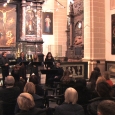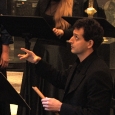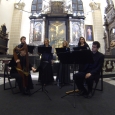BEAUTÉ PARFAITE
MUSIC FROM CICONIA'S TIME
Johannes Ciconia was a Franco-Flemish composer born in Liège around 1370, and was active essentially in Italy. Ciconia's work is varied in genre (madrigal, virelai, ballata, canon), language (French, Italian, Latin), and especially regarding the musical stylistic features. He held important positions in Rome, Pavia and Padua, and he is the composer around 1400 from which we have nowadays the biggest amount of surviving music.
Ciconia lived in the transitional period of medieval and renaissance music, when the Ars Subtilior flourished. Ars Subtilior refers to a very particular music style, which combines different rhythmic structures at the same time. Although many Ciconia’s compositions are written in this form, a big part of his work is composed in different ones, sometimes in an ancient, some times in a revolutionary way.
In this program, which illustrates the eclecticism of Johannes Ciconia’s music, we included representative pieces of the Ars Subtilior style, by composers like Jacopo da Bologna, Zanino da Padua and Anthonello da Caserta, and pieces from the emblematic Codex Faenza, a 15th century musical compendium containing some of the oldest preserved keyboard music, with diminutions for vocal pieces of several “trecento” composers, like Guillaume de Machaut.
Programme
Anonym (Codex Faenza), Kyrie
Johannes Ciconia, O Felix Templum Jubila
Anthonello da Caserta, Beauté Parfaite
Johannes Ciconia, Ut te per Omnes Celitus
Anonym (Codex Faenza), Gloria
Antonio Zacara da Teramo, Un fior gentil (instr.)
Johannes Ciconia, Venetia, mundi splendor
Johannes Ciconia, Albane, Misse Celitus
Johannes Ciconia, O Rosa Bella
Gillaume de Machaut (Codex Faenza), De tout flors (instr.)
Johannes Ciconia, O Padua, sidus Praeclarum
Johannes Ciconia, Ligiadra Donna
Johannes Ciconia, Una Panthera (instr.)
Johannes Ciconia, Doctorum Principem
Formation:
3 singers, 1 recorder, 1 organetto, 1 fidel
|
|
|
|





